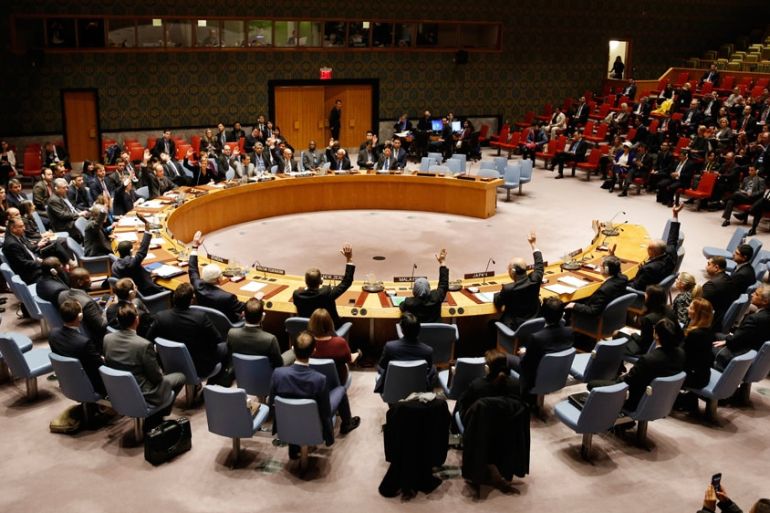Russia seeks UN endorsement of Syria truce
Security Council expected to vote on proposed resolution after Russian ambassador submits final document on ceasefire.

Russia has urged the UN Security Council to give its blessing to the ceasefire in Syria, the third truce this year seeking to end the nearly six years of war in Syria.
The Security Council met behind closed doors for an hour on Friday to consider a proposed resolution endorsing the ceasefire that Russia and Turkey announced on Thursday.
Al Jazeera has obtained the draft document, which provides details of the ceasefire and the planned peace negotiations.
According to the document, the armed opposition is committed to forming a delegation independently by January 16, 2017, and to attending the planned peace negotiations with the government in Kazakhstan’s capital, Astana, on January 23, 2017.
The Syrian government delegation will take part in joint meetings with the opposition starting from January 15, 2017, in Astana, in which the UN will participate, the document says.
![There is confusion over which Syrian rebel groups are covered by the truce [Abd Doumany/AFP]](/wp-content/uploads/2016/12/acfa6e784d314afab5e000743c41ad4c_18.jpeg)
It is not clear whether a difference in the dates of the two delegations joining the negotiations was meant to be different or was a typo in the draft.
A UN vote is possible as early as Saturday, although Security Council members recommended changes to the draft and it will probably be revised, Vitaly Churkin, Russia’s ambassador, said after the closed-door meeting.
“I think those accommodations can be easily absorbed into the draft,” he said.
It was not immediately clear if the resolution would win broad support.
READ MORE: Clashes erupt near Damascus despite truce
Meanwhile, there is confusion over which Syrian opposition groups are covered by the ceasefire.
The Syrian government says the agreement does not include the Islamic State of Iraq and the Levant (ISIL) group; fighters from al-Qaeda’s former branch, al-Nusra Front; and factions linked to these armed groups.
But several rebel officials said on Thursday that the agreement did include the former al-Nusra Front – now known as Jabhat Fateh al-Sham – which announced in July that it was severing ties with al-Qaeda.
|
|
For its part, the Jabhat Fateh al-Sham has criticised the ceasefire for not mentioning President Bashar al-Assad’s fate, and said the political solution under this agreement would “reproduce the criminal regime”.
“The solution is to topple the criminal regime militarily,” a spokesman for the fighters said in a statement on Friday.
Ahrar al-Sham, another powerful opposition armed group, says it has not signed the ceasefire agreement because of “reservations” but has not elaborated.
The United States, in the waning days of Barack Obama’s administration, has been sidelined in recent negotiations and is not due take part in the Astana talks.
Russia has said the US could join a fresh peace process once Donald Trump takes office as president on January 20.
It also wants Egypt to join, together with Saudi Arabia, Qatar, Iraq, Jordan and the US.
Trump has said he will cooperate more closely with Russia on counterterrorism measures.
However, it is unclear what that policy will look like, given resistance from the Pentagon and the US intelligence community to closer cooperation with Russia on Syria.
|
|